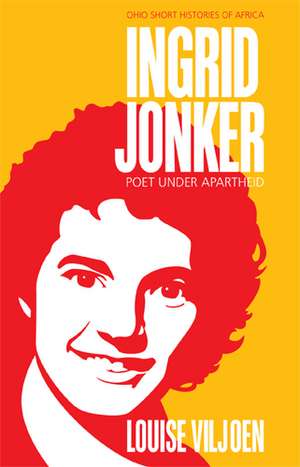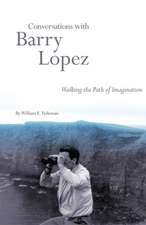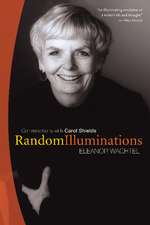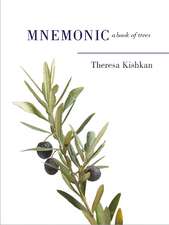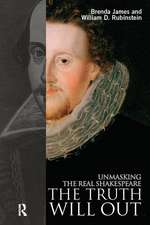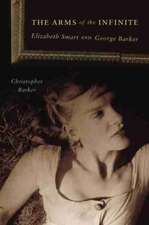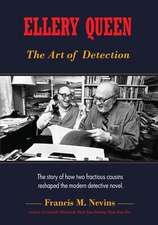Ingrid Jonker: Poet under Apartheid: Ohio Short Histories of Africa
Autor Louise Viljoenen Limba Engleză Paperback – 14 mar 2013
Nelson Mandela brought the poetry of Ingrid Jonker to the attention of South Africa and the wider world when he read her poem “Die kind” (The Child) at the opening of South Africa’s first democratic parliament on May 24, 1994. Though Jonker was already a significant figure in South African literary circles, Mandela’s reference contributed to a revival of interest in Jonker and her work that continues to this day.
Viljoen’s biography illuminates the brief and dramatic life of Jonker, who created a literary oeuvre—as searing in its intensity as it is brief—before taking her own life at the age of thirty-one. Jonker wrote against a background of escalating apartheid laws, violent repression of black political activists, and the banning of the African National Congress and the Pan Africanist Congress. Viljoen tells the story of Ingrid Jonker in the political and cultural context of her time, provides sensitive insights into her poetry, and considers the reasons for the enduring fascination with her life and death.
Her writings, her association with bohemian literary circles, and her identification with the oppressed brought her into conflict with her father, a politician in the white ruling party, and with other authority figures from her Afrikaner background. Her life and work demonstrate the difficulty and importance of artistic endeavor in a place of terrible conflict.
Viljoen’s biography illuminates the brief and dramatic life of Jonker, who created a literary oeuvre—as searing in its intensity as it is brief—before taking her own life at the age of thirty-one. Jonker wrote against a background of escalating apartheid laws, violent repression of black political activists, and the banning of the African National Congress and the Pan Africanist Congress. Viljoen tells the story of Ingrid Jonker in the political and cultural context of her time, provides sensitive insights into her poetry, and considers the reasons for the enduring fascination with her life and death.
Her writings, her association with bohemian literary circles, and her identification with the oppressed brought her into conflict with her father, a politician in the white ruling party, and with other authority figures from her Afrikaner background. Her life and work demonstrate the difficulty and importance of artistic endeavor in a place of terrible conflict.
Din seria Ohio Short Histories of Africa
-
 Preț: 107.46 lei
Preț: 107.46 lei -
 Preț: 80.78 lei
Preț: 80.78 lei -
 Preț: 107.19 lei
Preț: 107.19 lei -
 Preț: 91.95 lei
Preț: 91.95 lei -
 Preț: 91.95 lei
Preț: 91.95 lei -
 Preț: 233.69 lei
Preț: 233.69 lei -
 Preț: 108.33 lei
Preț: 108.33 lei -
 Preț: 93.23 lei
Preț: 93.23 lei -
 Preț: 107.42 lei
Preț: 107.42 lei -
 Preț: 107.19 lei
Preț: 107.19 lei -
 Preț: 107.71 lei
Preț: 107.71 lei -
 Preț: 253.24 lei
Preț: 253.24 lei -
 Preț: 107.51 lei
Preț: 107.51 lei -
 Preț: 107.96 lei
Preț: 107.96 lei -
 Preț: 107.70 lei
Preț: 107.70 lei -
 Preț: 108.18 lei
Preț: 108.18 lei -
 Preț: 132.74 lei
Preț: 132.74 lei -
 Preț: 131.82 lei
Preț: 131.82 lei -
 Preț: 130.46 lei
Preț: 130.46 lei -
 Preț: 131.82 lei
Preț: 131.82 lei -
 Preț: 130.84 lei
Preț: 130.84 lei -
 Preț: 129.86 lei
Preț: 129.86 lei -
 Preț: 130.84 lei
Preț: 130.84 lei -
 Preț: 129.86 lei
Preț: 129.86 lei -
 Preț: 130.84 lei
Preț: 130.84 lei -
 Preț: 131.23 lei
Preț: 131.23 lei -
 Preț: 129.86 lei
Preț: 129.86 lei -
 Preț: 142.97 lei
Preț: 142.97 lei -
 Preț: 141.62 lei
Preț: 141.62 lei
Preț: 130.84 lei
Nou
Puncte Express: 196
Preț estimativ în valută:
25.04€ • 26.21$ • 20.84£
25.04€ • 26.21$ • 20.84£
Carte tipărită la comandă
Livrare economică 31 martie-14 aprilie
Preluare comenzi: 021 569.72.76
Specificații
ISBN-13: 9780821420485
ISBN-10: 0821420488
Pagini: 166
Dimensiuni: 108 x 178 x 13 mm
Greutate: 0.14 kg
Ediția:1
Editura: Ohio University Press
Colecția Ohio University Press
Seria Ohio Short Histories of Africa
ISBN-10: 0821420488
Pagini: 166
Dimensiuni: 108 x 178 x 13 mm
Greutate: 0.14 kg
Ediția:1
Editura: Ohio University Press
Colecția Ohio University Press
Seria Ohio Short Histories of Africa
Notă biografică
Louise Viljoen teaches in the Department of Afrikaans and Dutch at Stellenbosch University in South Africa. She is well known as a literary critic and book reviewer, and has recently published a study of Antjie Krog, a prominent contemporary South African poet, writer, and academic, best known for her book, Country of My Skull.
Descriere
Nelson Mandela brought the poetry of Ingrid Jonker to the attention of South Africa and the wider world when he read her poem “Die kind” (The Child) at the opening of South Africa’s first democratic parliament on May 24, 1994.
